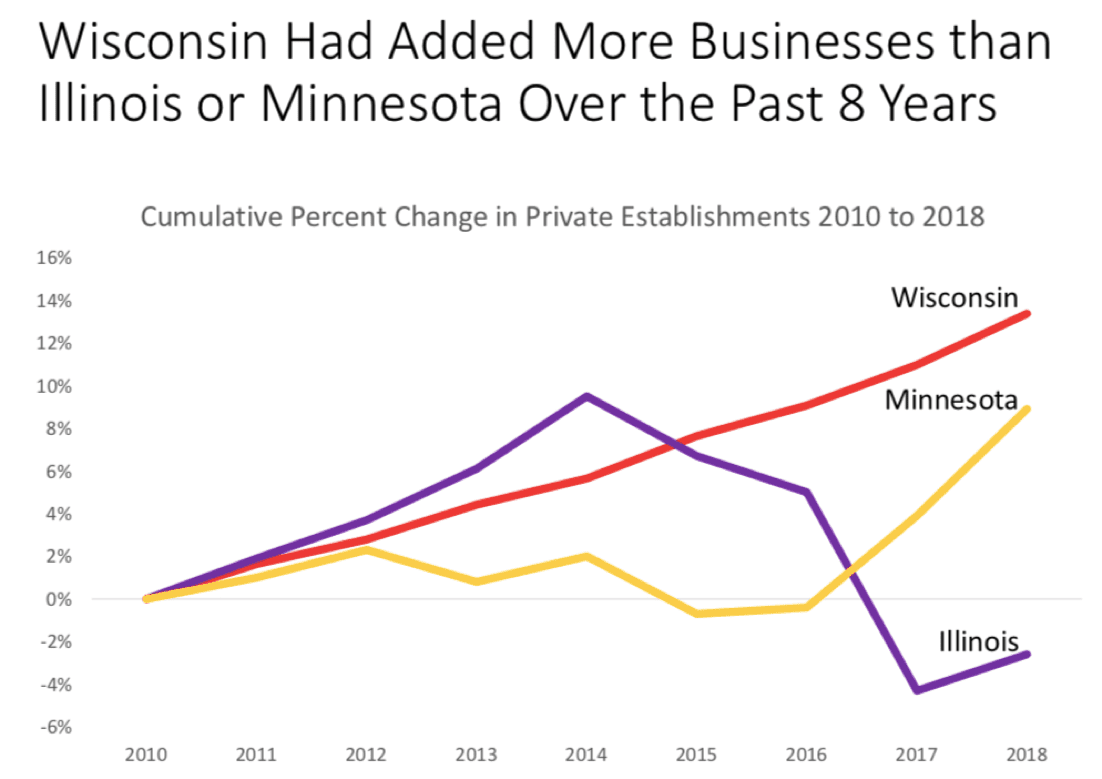By Tom Still
 MADISON, Wis. – Much like debunking an urban legend that seems to live on regardless of evidence to the contrary, the myth endures that Wisconsin is 50th among the 50 states in starting new companies.
MADISON, Wis. – Much like debunking an urban legend that seems to live on regardless of evidence to the contrary, the myth endures that Wisconsin is 50th among the 50 states in starting new companies.
That’s despite the fact the Ewing Marion Kauffman Foundation hit the pause button on the annual report that placed Wisconsin at the bottom, year after year. Kauffman took a timeout to study its methodology and produced a different set of rankings last year.
While no one claims Wisconsin is tops among the states when it comes to startups of all descriptions, statistics collected by the state Department of Revenue paint a more comprehensive picture of how the state is performing. The report is a bit of myth-buster.
John Koskinen, the veteran chief economist at Revenue, delivered a summary at a recent meeting of economic development professionals and others from across Wisconsin. His key points:
- Net business creation in Wisconsin has improved since 2010, in large part because company failure rates are lower than the U.S. average. Wisconsin ranked 16th in net business creation in 2016, thanks to the combination of a middling startup rate (33rd among the states) and a lower failure, or “exit,” percentage rate (2nd).
- Business expansion in Wisconsin is geographically balanced, especially compared to neighbors such as Illinois and Michigan.
- The state ranks in the middle of the 50 states for venture capital, which is small comfort because 80 percent of that asset class is clustered in three states – California, Massachusetts and New York.
- As a result, young companies often find other ways to raise money. That includes personal assets and business loans from banks and other institutions, which are offered at nearly double the U.S. average.
- Wisconsin is a surprising leader (18th) in private equity, which are investments not found on public exchanges, and usually spent on acquisitions and mergers. That’s consistent with Revenue’s conclusion that much like Wisconsin is a state of mid-sized cities, it is a state of mid-sized companies. All but 457 of Wisconsin’s 23,850 companies in early 2019 employed fewer than 100 people.
While Minnesota is often cited as a Midwest version of Silicon Valley when it comes to business expansion, the Revenue report noted Wisconsin’s slow but steady performance of late in the percentage increase in the number of private establishments.
Between 2010 and 2018, Wisconsin added new businesses at a rate of 13 percent. Minnesota added businesses at a 9 percent clip and Illinois lost about 2 percent, with the biggest drop occurring in the past five years.
Between the fourth quarter in 2017 and the end of 2018, Wisconsin’s net business expansion rate (3.13 percent) was identical to California and higher than any neighboring state except Minnesota.
In one particularly telling graphic that spoke to the growth in southeast and south-central Wisconsin, every Wisconsin county north of the Illinois border showed a percentage increase in the number of business establishments between 2015 and 2018. Every Illinois county south of the border, except for one, showed a loss.
Anecdotal examples of the rise in net company creation will be on hand Nov. 6-7 at the Wisconsin Early Stage Symposium in Madison, where a record number of applicants will meet with investors from far and wide.
The Revenue summary didn’t draw many conclusions about what factors have contributed to the state’s solid performance in net company creation, other than higher survival rates for young companies. Some reasons may be largely cultural – the stubbornness of Wisconsin founders, a bootstrapping mentality and a talent for making cash last longer.
Other factors might include well-developed entrepreneurial support systems that aren’t always found in other states, lower overall business costs and a skilled workforce, although it’s hard to find a business owner who says there are enough good workers to go around.
Wisconsin is far from 50th in creating young companies, but the state is likely equally distant from being No. 1. More attention to promising young companies will help to create a brighter future.
Still is president of the Wisconsin Technology Council. He can be reached at tstill@wisconsintechnologycouncil.com
###






